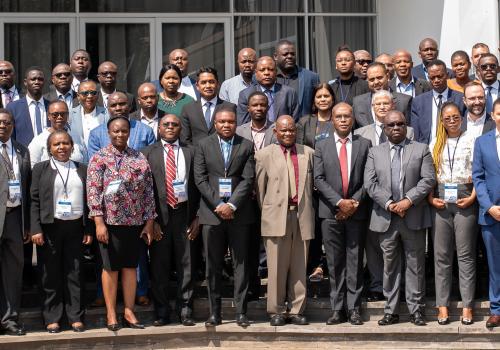Senior Officials responsible for Treasury and Energy in the Southern African Development Community (SADC) held a regional workshop in Johannesburg, South Africa, on 19th September 2022 to deliberate on the proposal to develop a Regional Transmission Infrastructure Financing Facility (RTIFF) which is aimed at providing a long-term solution to energy financing challenges within the Region.
Most of the mainland SADC Member States are experiencing insufficient supply of electricity due to frequent breakdown of aging power generation plants; inadequate power generation capacity to meet growing demand; inadequate transmission interconnectors to fully facilitate energy trading between SADC Member States and congested power lines along the main power transfer corridors.
Furthermore, energy infrastructure projects are capital intensive and most Member States may not have adequate sovereign capital to individually develop energy generation and transmission infrastructure.
The consultative workshop took place against the backdrop of the identified challenges which all need a consolidated regional approach through pooled resources. To this end, a RTIFF has been identified as one of the viable mechanisms for financing of resilient energy infrastructure in order to secure long-term energy supply. The RTIFF, once established and operationalised, is expected to assist Member States that have challenges in raising funds for electricity transmission projects of national and regional importance.
In his introductory remarks at the workshop, the Deputy Executive Secretary responsible for Regional Integration at the SADC Secretariat, Dr. Thembinkosi Mhlongo, highlighted that SADC Member States and their national power utilities were not necessarily required to participate as investors because RTIFF will be a funding platform that complements Development Finance Institutions (DFIs) lending with pooled debt.
The objectives of the consultative workshop were to discuss how the SADC Member States could address their energy infrastructure financing needs through innovative financing mechanisms for regional transmission projects by leveraging resources from the International Coopering Partners, and the private and public sectors.
In her opening remarks, Ms. Elsie Salima from the Ministry of Finance and Economic Affairs in Malawi, reiterated that RTIFF was expected to facilitate the implementation of regional transmission projects and corridors, and therefore the outcome of the consultative engagement including financial modelling and priority projects that will support the RTIFF concept would be presented to the SADC Committee of Ministers of Finance and Investment for consideration.
The importance of enhancing interconnection and power trade to increase the reliability of supply and connect three outstanding Member States, namely Angola, Malawi and the United Republic of Tanzania, onto the Southern African Power Pool (SAPP) has been acknowledged by SADC.
The Executive Director of SAPP, Engineer Steve Dihwa, reaffirmed that SAPP has formally committed US$20 million as anchor investment to RTIFF to unlock opportunities for attractive engagements with SADC, potential funders, financiers and project sponsors. He added that strengthened transmission corridors, through a regional approach, across the mainland SADC Member States with national power utilities participating in the SAPP could bring US$37 billion of cost saving in Net Present Value (NPV).
“The benefits of RTIFF also include strengthening the case for investment in renewable generation and creating new opportunities for additional sources of project financing, increased use of private capital and private sector participation,” he said.
The workshop concluded that RTIFF was an innovative instrument to drive investments in energy transmission projects and could attract private sector participation in their capitalisation. As a way forward, the recommendations of the workshop would be presented to the SADC Committee of Ministers of Finance and Investment for further consideration.

